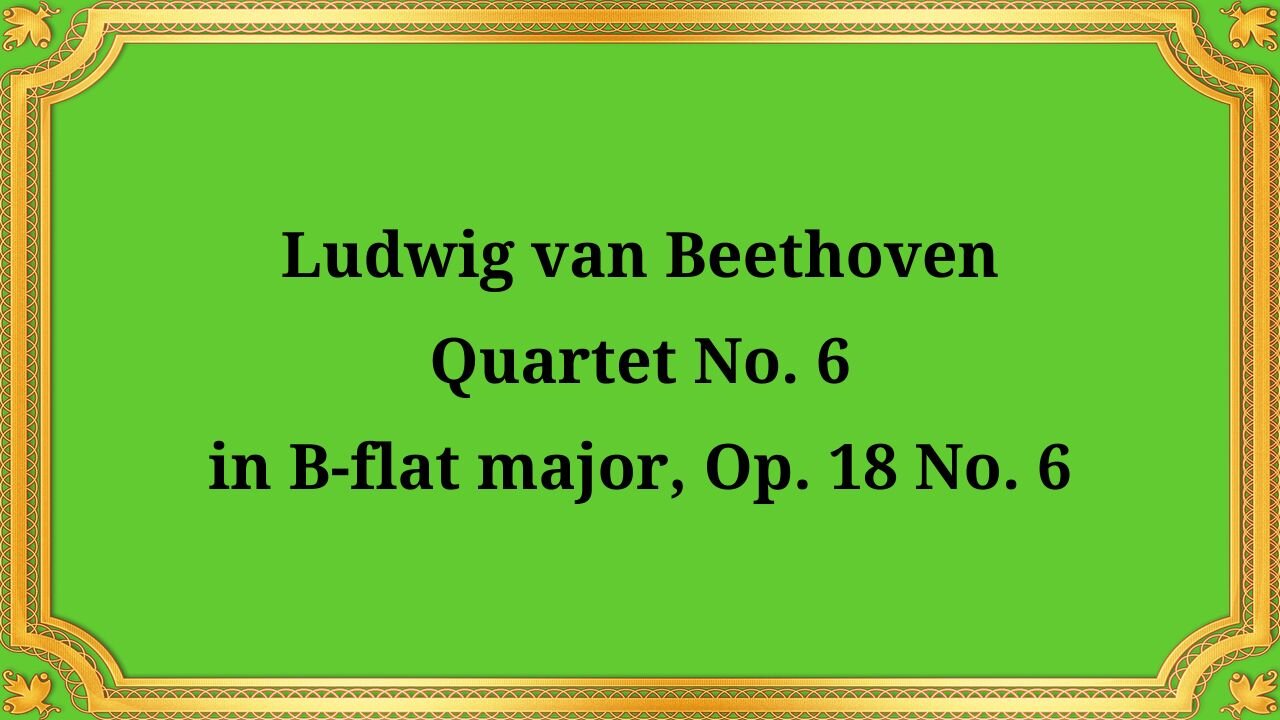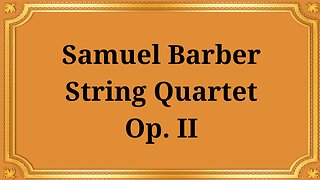Premium Only Content

Ludwig van Beethoven Quartet No. 6 in B-flat major, Op. 18 No. 6
#rarity #Beethoven #String_Quartet #Classical_Music #Chamber_Music
Date of publication: 1948
Budapest String Quartet
00:00/04:35/11:26/14:40
Ludwig van Beethoven's six string quartets, Op. 18, are his monumental entry into a genre dominated by Haydn and Mozart. Although the set is renowned for its dramatic intensity, the final Quartet No. 6 in B-flat major offers a surprising and profound conclusion. Written between 1798 and 1800, this is a work of exciting contrasts, beginning with energetic classicism and ending with one of Beethoven’s most personal and striking movements.
The quartet opens with the buoyant and joyful “Allegro con brio”. Its main theme is graceful and playful, firmly rooted in the high classical tradition. This movement is a masterclass in balanced structure and energetic dialogue between the four instruments, demonstrating Beethoven’s complete mastery of the established quartet style.
The following *Adagio ma non troppo* creates a solemn, lyrical contrast. It is a deeply expressive song without words, with the viola and cello often providing a pulsating accompaniment to the soaring melodies of the violins. This heartfelt movement reveals the young composer’s capacity for deep emotional depth.
The third movement, the fast-paced and playful *Scherzo: Allegro*, returns to a lighter mood. Its rhythmic drive and playful nature serve as a final burst of free energy before the quartet’s brilliant finale.
The real innovation lies in the last movement, which Beethoven called “La malinconia” (“Melancholia”). This opening is unprecedented – a slow, despairing and harmonically unstable exploration of profound sadness. It is a startlingly intimate glimpse into Beethoven’s inner world, a premonition of the struggle with hearing loss and loneliness that defined his later years. This darkness is repeatedly interrupted by the frantic, dance-like *Allegretto* section, creating a turbulent and dramatic struggle between despair and forced joy. This bold, psychological finale transforms the entire quartet, elevating it from a superb classical work to a deeply human and revolutionary piece of music.
Dear listeners, you have the opportunity to support the channel:
https://t.me/rad_siar_al_bot
https://destream.net/live/RadSiarAl/donate
https://www.donationalerts.com/r/radsiaral
-
 16:45
16:45
Classical music_Music Inspiration
1 month agoSamuel Barber String Quartet, Op. II
632 -
 25:50
25:50
ChopstickTravel
18 days ago $3.02 earned24 Hours With Sri Lanka’s Vedda People!! (Barehand Honey Harvest)
22.8K5 -
 8:13
8:13
Danny Rayes
1 day ago $2.23 earnedMost Hated Teacher on Tiktok
13.8K13 -
 15:31
15:31
Chris Harden
9 days ago $3.38 earnedWhat Happened to Kewanee, Illinois?
16.9K11 -
 10:13
10:13
JohnXSantos
1 day ago $0.64 earnedThis AI Tool Makes Product Manufacturing 10X Smarter (FOR FREE)
11.6K3 -
 16:28
16:28
Artur Stone Garage
12 days ago $1.69 earned$1000 AUDI A4 — WILL IT START After 10 Years?
15.6K1 -
 26:57
26:57
Advanced Level Diagnostics
18 days ago $0.77 earned2021 Ram Promaster - No Crank! Key Stuck In Ignition! Diag & Fix!
11.2K1 -
 8:11
8:11
MattMorseTV
20 hours ago $20.86 earnedTrump's DECLARATION of WAR.
48.7K98 -
 3:44
3:44
GritsGG
19 hours agoUpdate Your Warzone Loadouts w/ These Tips!
23.1K1 -
 2:31:01
2:31:01
The Connect: With Johnny Mitchell
21 hours ago $28.87 earned"It's About To Get Worse"- CIA Agent Andrew Bustamante Explains Why It's Time To Leave America
29.3K55